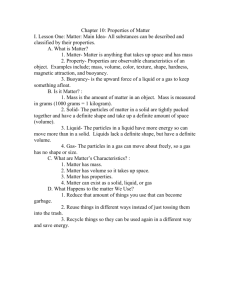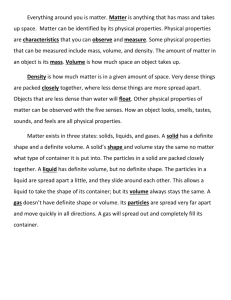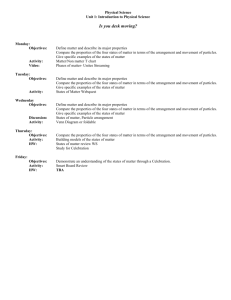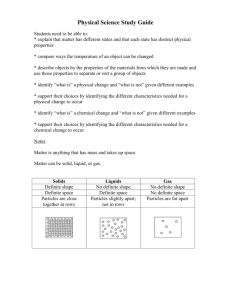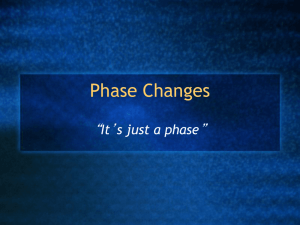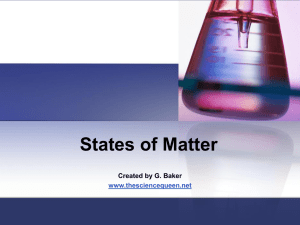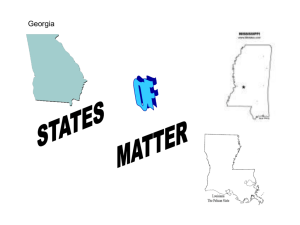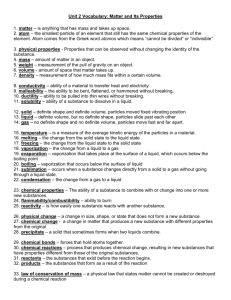States of Matter - OCPS TeacherPress
advertisement
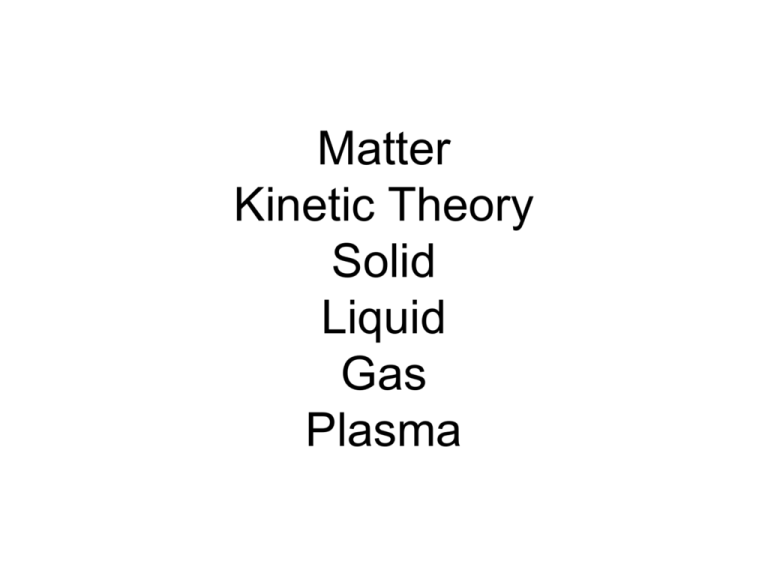
Matter Kinetic Theory Solid Liquid Gas Plasma Matter Matter • Anything that has mass and occupies space • The materials or “stuff” that all objects and substances in the universe are made of • 4 States of Matter = Solid, liquid, gas, and plasma Matter • Because all matter takes up space (has volume) and contains a certain amount of material (has mass), all matter can be detected and measured Examples of Matter • Rocks, water, trees, bicycles, lighting, animals, stars, smoke, are all easily seen and observed • Dust mites that live in your furniture and rugs you may need a microscope to view • Air maybe invisible but we can feel it when the wind blows and see it bend the branches of trees (oxygen, nitrogen, hydrogen, CO2) What is not matter? • Light • Sound • Gravity • Friction Part (a) Matter is made up of ATOMS! Atoms are little bits too small for us to see. They are so tiny you can’t break them down further. 7 Matter • Atoms are the building blocks of matter • The elements in our periodic table make up all matter Kinetic Theory Kinetic Theory All matter consists of tiny particles that are in constant motion. Kinetic Theory 1. All matter is composed of small particles (atoms, molecules, or ions). There is an attractive force between them. 2. They are in constant, random motion. The particles may collide with one another or the sides of their container. 3. As the temperature increases the speed of the particles increases. As the temperature decreases the speed of the particles decreases. Solid SOLIDS •State of matter that has a definite shape and a definite volume. •Particles of solids are tightly packed, vibrating about a fixed position. •Particles are strongly attracted to each other Part (b) SOLID 15 Examples of Solids Liquid LIQUID A state of matter that has a definite volume but takes the shape of its container Liquids do not have a definite shape Particles of liquids are tightly packed, but are far enough apart to slide over one another, allowing it to flow Liquid Examples of Liquid Gas GAS A state of matter that has no definite shape and no definite volume; expands to fill the shape of its container Particles of gases are very far apart and move freely. Attractive forces are very weak • Contain mostly empty space – because the particles are so far apart • Particles spread throughout a given volume until distributed equally – diffusion Gas vs. Vapor • Gas – a substance that is naturally in the gaseous state at room temperature • EXAMPLE: Helium • Vapor – the gaseous state of a substance that is a solid or liquid at room temperature • EXAMPLE: Steam Examples of Gas Plasma PLASMA A state of matter that does not have a definite shape or volume and whose particles have broken apart Consists of + and – charged particles (electrons are knocked off due to collisions) A plasma is a very good conductor of electricity and is affected by magnetic fields. • Plasma is the most common state of matter in the universe Some places where plasmas are found… 1. Flames 2. Lightning 3. Aurora (Northern Lights) Neon Sign The Sun is an example of a star in its plasma state STATES OF MATTER SOLID LIQUID GAS PLASMA Tightly packed, in a regular pattern Vibrate, but do not move from place to place, definite shape and volume Close together with no regular arrangement. Move about, flow and slide past each other. Definite volume, no definite shape takes shape of its container. Well separated with no regular arrangement. Move freely at high speeds. No definite shape or volume. Easily compressible. Has no definite volume or shape and is composed of electrical charged particles PLC-Unit 1B STATES OF MATTER SOLID Tightly packed, in a regular pattern Vibrate, but do not move from place to place LIQUID Close together with no regular arrangement. Vibrate, move about, and slide past each other GAS Well separated with no regular arrangement. Vibrate and move freely at high speeds PLASMA Has no definite volume or shape and is composed of electrical charged particles Phase Change A transition of matter from one state to another. Some phase changes are more common and easier for us to visualize. For example, you have probably witnessed freezing, melting, and vaporization just by making ice, melting ice, and boiling water. Condensation often occurs on the outside of cold beverage containers. This is when the humid air changes directly to a liquid on the surface of the container. Sublimation Dry ice is actually solid carbon dioxide. When it sits in the open or is placed in water it rapidly changes directly from solid to gas creating a foggy cloud. Deposition Frozen patterns of ice on your car windshield is an example. Deposition involves a gas changing to a solid. This occurs during winter months when the humid air directly freezes into solid ice. Ionization and recombination do not occur often around us. These processes involve high energy matter found in lightning and stars changing from one form to another. Characteristics 1. Definite shape and volume Characteristics Examples Examples 2. Particles tightly packed 1. rock 1. water 3. Particles vibrate 2. book 2. soda 4. Particles strongly attracted to each other 3. ice 3. milk Solid 1. Definite volume 2. No definite shape, takes shape of container 3. Particles close together but move or flow, by sliding over each other 4. Attractive forces between particles are weaker Liquid States of Matter Characteristics 1. No definite shape or volume 2. Consists of + and – charged particles 3. Occurs at high temperatures, particles moving very fast 4. Most common state of matter in the universe Plasma Examples Characteristics Gas Examples 1. No definite shape or volume 1. Lighting 1. Oxygen 2. Particles are so far apart they are no longer touching 2. stars 2. Nitrogen 3. Diffusion 3. CO2 4. Attractive forces between particles is very weak 3. Neon signs 5. Easily compressable Shape Volume Compressibility Definite Definite Not Easily No Definite Definite Not Easily No Definite No Definite Easily No Definite No Definite Easily Solid Liquid Gas Plasma Solid Arrangement of particles Distance between particles Motion of particles Force between particles Regular or orderly arrangement Tightly packed Vibrate around fixed point Strong attraction Slow movement, flows, slide over one another Liquid No regular arrangement Close together Moderate attraction Gas No regular arrangement Far apart Fast movement Very weak attraction Plasma No regular arrangement Far apart, electrons have been knocked off Very fast movement Very weak attraction
